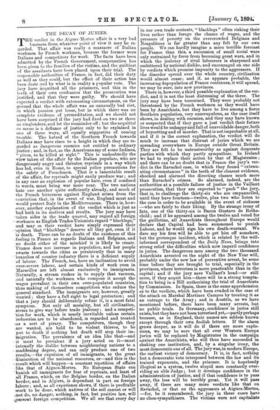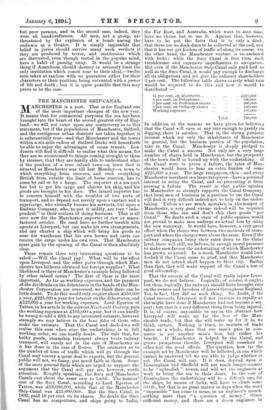THE DECAY OF JURIES. T HE verdict in the Aiguer-Mortes affair
is a very bad business from whatever point of view it may be re- garded. That affair was really a massacre of Italian workmen by French workmen, because the former were Italians and competitors for work. The facts have been admitted by the French Government, compensation has been given to the families of the victims, and the guiltiest of the assailants have been placed upon their trial. The responsible authorities of France, in fact, did their duty -as well as they could, but the effect of their action has been destr ,yed by what is in reality a popular vote. The jury have acquitted all the prisoners, and this in the teeth of their own confession that the prosecution was justified, and that they were guilty. We should have expected a verdict with extenuating circumstances, on the ground that the whole affair was an unusually bad riot, in which passion got loose, but in which there was no complete evidence of premeditation, and we should not have been surprised if the jury had fixed on two or three as ringleaders, and let the remainder off ; but the acquittal en masse is a defiance of justice only to be explained in one of three ways, all equally suggestive of coming trouble. The hatred of the Southern French towards Italians may have risen to a height in which they are re- garded as dangerous enemies not entitled to ordinary justice ; and, in fact, as the Americans say of some Indians, " pizon, to be killed at sight." This is undoubtedly the view taken of the affair by the Italian populace, who are dangerously angry and threaten reprisals in a way which has led, even in Rome, to special police precautions for the safety of Frenchmen. That is a lamentable result of the affair, for reprisals might easily produce war ; and in any case an explosion of popular hate, even if confined to words, must bring war more near. The two nations hate one another quite sufficiently already, and much of the French bitterness against England arises from the ,eonviction that, in the event of war, England must and would protect Italy in the Mediterranean. There is, how- ever, another explanation of the verdict which is just as bad both in its motives and results. The jury may have 'taken sides in the trade quarrel, may regard all foreign --workmen as English Trades-Unionists regard " blacklegs," and may in their verdict have simply expressed their - 'opinion that " blacklegs " deserve all they get, even if it is death. There can be no doubt of the existence of this _feeling in France as regards Italians and Belgians, and no doubt either of the mischief it is likely to create. Trance does not increase in population, and her people swarm towards the cities so persistently that in many "branches of country industry there is a deficient supply of labour. The French, too, have an inclination to avoid over-severe labour, and certain kinds of work even in 'Marseilles are left almost exclusively to immigrants. 'Naturally, a stream rushes in to supply that vacuum, and naturally the workmen who compose it accept the wages prevalent in their own over-populated countries, 'thus making of themselves competitors who reduce the general standard. The immigrants are, however, greatly wanted ; they have a full right to legal protection; and 'that a jury should deliberately refuse it, is a most fatal symptom. Not only all morality, but all civilisation, seems to give way before trade jealousy ; and a competi- tion for work, which is nearly inevitable unless certain industries are to be abandoned, is regarded and treated -as a sort of piracy. The competitors, though they are wanted, are held to be violent thieves, to be put to death if nothing but death will stop their im- migration. The prevalence of an idea like that—and it must be prevalent if a jury acted on it—must intensify the dislike between neighbouring nations to a maddening degree, and can only produce one of two results,—the expulsion of all immigrants, to the great - diminution of the national resources, or—and this is the --result which will happen—a constant repetition of affairs like that of Aigues-Mortes. No European State can -banish all immigrants for fear of reprisals, and least of all France, which, on the Belgian border, on the Italian border, and in Algiers, is dependant in part on foreign labour ; and, as all experience shows, if there is profitable work to be done, which natives of the soil cannot or will ,not do, no danger, nothing, in fact, but positive law, will zisevent foreign competition. We all see that every day in our own trade contests, " blacklegs " often risking their lives rather than forego the chance of wages, and the pressure of poverty on the overcrowded Belgians and Neapolitans is far greater than any felt by our own people. We can hardly imagine a more terrible forecast for France than this, a succession of small social wars only restrained by force from becoming great wars, and in which the jealousy of rival labourers is sharpened and embittered by national dislike, and encouraged on one side by verdicts which promise impunity to the aggressors. If the disorder spread over the whole country, civilisation would almost cease ; and if, as appears probable, the increasing depopulation of France continues, it will spread, we'may be sure, into new provinces. There is, however, a third possible explanation of the ver- dict, and it is not the least distressing of the three. The jury may have been terrorised. They were probably not threatened by the French workmen as they would have been by Anarchists, but they have to live among a fierce Southern population, very unscrupulous, as the case itself shows, in dealing with enemies, and they may have known or suspected that if they gave a just verdict their future lives would be unhappy and full of unavoidable dauger,both of boycotting and of murder. That is not improbable at all, and if it is the correct explanation, the verdict will do much to increase that distrust of juries which we see spreading everywhere in Europe outside Great Britain.
They are felt to be untrustworthy as against desperate parties with which they partly sympathise. In Ireland we had to replace their action by that of Magistrates ; and there can be no doubt that in France the jury's ver- dict in the Ravachol case, in which they found " extenu- ating circumstances " in the teeth of the clearest evidence, shocked and alarmed the directing classes much more than Ravachol's crimes. So alarmed, indeed, are the authorities at a possible failure of justice in the Valliant prosecution, that they are expected to " pack " the jury, that is, to challenge the thirty-six who are empannelled, until they have fourteen—twelve, plus two who listen to the case in order to be available in the event of sickness —who are fairly to their liking. By the strange irony of fate, one of the thirty-six is Baron Gustave de Roths- child ; and if he appeared among the twelve and voted for the guillotine, all Anarchists throughout Europe would. declare that Capital had been summoned. to punish Labour, and he would sign his own death-warrant. We dare say his firm will be able to get him off somehow, but the grotesque incident, which is related by the well- informed correspondent of the Daily News, brings into strong relief the difficulties which now imperil confidence in juries. The dangerous men among the two thousand Anarchists arrested on the night of the New Year will, probably under the new law of preventive arrest, be some time before they are brought to trial, especially in the provinces, where terrorism is more practicable than in the capital ; and if the jury save Vaillant's head—or still more, if they acquit him—there will be a strong tempta- tion to bring iu a Bill authorising the trial of Anarchists by Commission. In Spain, there is the same apprehension as to the verdicts, which have been evaded in the case of the attack on Marshal Martinez Campos by treating it as an outrage to the Army ; and in Austria, as we have mentioned before, there have been many arrests, but no public trials. In Germany, confidence in juries still exists, but they have not been terrorised yet,—partly perhaps because, as in England, their names are seldom known except through their own foolish letters. If the alarm grows deeper, as it will do if there are more explo- sions, we may be sure that all over Western Europe juries will be replaced by Magistrates in the campaign against the Anarchists, who will thus have succeeded in shaking one institution, and, by a singular irony, the most democratic one of all. The jury was, in modern Europe, the earliest victory of democracy. It is, in fact, nothing but a democratic vote interposed between the law and its trained exponents, and the prisoner. It is hopelessly illogical as a system, twelve stupid men constantly over- riding an able Judge ; but it develops confidence in the administration of justice, and if that confidence is to pass away, 'the loss will be terribly great. Yet it will pass away, if there are many more verdicts like that on Ravachol, or that on the aggressors at Aigues-Mortes, —for, be it remembered, the jury in those cases have no class-sympathisers. The victims were not capitalists but poor persons, and in the second case, indeed, they were all handicraftsmen. All men, not a group, are threatened by the explosion of a bomb among the audience at a theatre. It is simply impossible that belief in juries should survive many such verdicts if they are produced by terror, and institutions which are distrusted, even though rooted in the popular mind, have a habit of passing away. It would be a strange thing if Anarchism should destroy or seriously limit thb only institution which comes near to their ideal,—twelve men taken at random with no guarantee either for their characters or their position, being entrusted with a power of life and death ; but it is quite possible that this may prove to be the case.











































 Previous page
Previous page